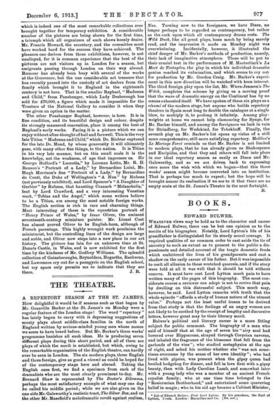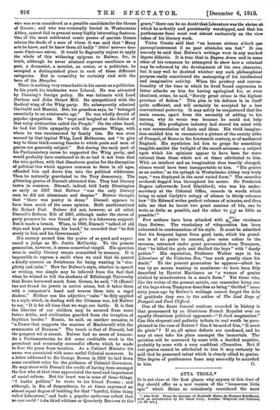BOOKS.
EDWARD BIILWER.
WHATEVER views may be held as to the character and career of Edward Bulwer, there can be but one opinion as to the merits of his biographer. Notably, Lord Lytton's life of his grandfather is distinguished for its sturdy moral courage. It required qualities of no common order to cast aside the tie of ancestry to such an extent as to present to the public a dis- passionate and detailed account of the tragic domestic feuds which embittered the lives of his grandparents and cast a shadow on the early career of his father. But it was impossible to omit all allusion to these wretched quarrels, and if the story were told at all it was well that it should be told without reserve. It must have cost Lord Lytton much pain to have written many of the pages of this biography. The most con- siderate course a reviewer can adopt is not to revive that pain by dwelling on this distressful subject. This much may, however, be said. Lord Lytton remarks with truth that the whole episode "affords a study of human nature of the utmost value." Perhaps not the least useful lesson to be derived from that study is that the feelings of an angry woman are not likely to be soothed by the receipt of lengthy and discursive letters, however great may be their literary merit.
Bulwer's political and literary career is a more fitting subject for public comment. The biography of a man who said of himself that at the age of seven his "airy soul had hovered over Hippocrene, strayed through Corycian caverns, and inhaled the fragrance of the blossoms that fell from the garlands of the vine "; who studied metaphysics at the age of eight, and asked his mother whether she "was not some- times overcome by the sense of her own identity" ; who had lived with gipsies, was present when the gipsy queen bad broiled hedgehog for dinner, and fell in love first with a gipsy beauty, then with Lady Caroline Lamb, and somewhat later with a young lady who was a member of an ancient French royalist family; who at one time time belonged to the " Rosicrucian Brotherhood," and entertained some quavering belief in magic ; who in his old age became a Cabinet Minister; • Life of Edward Butever, First Lord Lytton. By his grandson, the Earl of Lytton. 2 vols. London Macmillan and Co. [308. not.]
who was even considered as a possible candidate for the throne of Greece ; and who was eventually buried in Westminster Abbey, cannot fail to present many highly interesting features.
One of the most celebrated comic poems of ancient Greece relates the deeds of a man of whom it was said that "Many
arts be knew, and he knew them all badly" (rlifaa' *viol-aro ip7a, ccuriZs S'iertseave 1116,110. It would be flagrantly unjust to apply the whole of this withering epigram to Bulwer, for, in
truth, although he never attained supreme excellence as a poet, a dramatist, a novelist, an orator, or a politician, he occupied a distinguished place in each of these different categories. But in versatility he certainly vied with the hero of the Margites.
There is nothing very remarkable in his career as a politician. In his youth his tendencies were Liberal. He was attracted by Canning's foreign policy. He was intimate with Lord Durham and John Stuart Mill. He sympathized with the Radical wing of the Whig party. He subsequently admired Garibaldi and Mazzini. But, his grandson says, he "belonged essentially to an aristocratic age." He was wholly devoid of popular sympathies. He "wept and laughed at the follies of that noisy abstraction called the People." On the other hand, he bad but little sympathy with the genuine Whigs, with whom he was unconnected by family ties. He was even warned by that typical Whig, Lord Melbourne, not "to give way to those thick-coming fancies to which poets and men of genius are generally subject." But during the early part of his Parliamentary career he supported the Whig party, and would probably have continued to do so had it not been that the wire-pullers, with that disastrous genius for the disruption of political ties which appears common to them in all ages, offended him and drove him into the political wilderness. Then he naturally gravitated to the Tory democracy. The glittering genius of Disraeli attracted him. They had literary tastes in common. Disraeli, indeed, told Lady Blessington so early as 1837 that Bulwer "was the only literary man he did not abominate and despise." Brdwer thought that "there was poetry in dress." Disraeli appears to have been much of the same opinion. Both anathematized Sir Robert Peel. Bulwer did not, however, at all relish Disraeli's Reform Bill of 1867, although under the stress of party pressure Ile was forced to give it a lukewarm support.
But it made a breach. When, in 1868, Disraeli "talked of old days and kept pressing his hand," he recorded that "he felt steely to him and his Government."
His oratory earned him the praise of so good and experi- enced a judge as Mr. Justin McCarthy. To the present generation, however, it seems somewhat turgid. His speeches were in reality literary essays committed to memory. It is impossible to repress a smile when we read that he passed a kindly censure on Swinburne for being wanting in " shn- plicity and calm." How far Bulwer's style, whether in speech or writing, was simple may be inferred from the fact that when he wished to tell the students of Edinburgh University
that Rollie borrowed much from Greece, he said, "It (Rome) has not found its jewels in native mines, but it takes them
with a conqueror's hand and weaves them into a regal diadem." Neither can the adjective "calm" be fitly applied to a style which, in dealing with the Crimean war, led Bulwer to say, "It is for all time that we wage our battle. It is that the liberties of our children may be secured from some future Attila, and civilization guarded from the irruption of Scythian hordes." Russia, he said, on another occasion, is "a Power that supports the maxims of Machiavelli with the armaments of Brennus." The touch is that of Disraeli, but the pungent wit is absent. Bulwer had no sense of humour.
As a Parliamentarian be did some creditable work in the persistent and eventually successful efforts which he made to free the press from taxation. As a Cabinet Minister his name was associated with some useful Colonial measures. In a letter addressed to Sir George Bowen in 1859 be laid down some excellent rules for the guidance of Colonial Governors.
He may share with Disraeli the credit of having been amongst the few who at that time appreciated the need and importance of social reform. But his heart was in none of these things.
"1 loathe polities," he wrote to his friend Forster ; and although, in fits of despondency, he at times expressed an almost equal degree of loathing for that "hateful, bitter thing called Literature," and bade a popular authoress reflect that no one could "take third editions or Quarterly Reviews to the grave," there can be no doubt that Literature was the shrine at he ardently and persistently worshipped, and that his posthumous fame must rest almost exclusively on the view- taken of his literary work.
Victor Cousin said that "un homme skrieux n'ecrit quo parcequ'autrement ii ne pout atteindre son but." It can scarcely be said that Bulwer's writings were in any marked degree didactic. It is true that in Eugene Aram and in some other of his romances he attempted to show bow a criminal may be reformed by the development of his own character, but it may well be doubted whether any such philosophical purpose really constituted the mainspring of his intellectual and imaginative activity. When the prudery and conven- tionality of the time in which he lived found expression in bitter attacks on him for having apologized for, or even idealized, crime, he said, "Surely great crime is the highest province of fiction." This plea in his defence is in itself quite sufficient, and will certainly be accepted by a less - conventional posterity. It may safely be conjectured that the main reason, apart from the necessity of adding to his income, why he wrote was because he could not help - writing. His prodigious industry had stored his mind with a vast accumulation of facts and ideas. His vivid imagina- tion enabled him to reconstruct a picture of the society alike of Pompeii, of Rome in the fourteenth century, or of mediaeval England. His mysticism led him to grope for something tangible amidst the twilight of the occult sciences—a subject upon which his opinions appear to have been far more rational than those which are at times attributed to him. With an intellect and an imagination thus heavily charged, silence would have been insupportable to him. "His genius as an author," as his epitaph in Westminster Abbey very truly says, "was displayed in the most varied form." The cacoethes scribendi dogged him throughout his career. Sir Frederick Rogers (afterwards Lord Blachford), who was his under- secretary at the Colonial Office, records in words which bring to mind Carlyle's eulogy of silence in thirty volumes how "Sir Edward writes perfect volumes of minutes, and then tells me that he learnt two great maxims of life, one to write as little as possible, and the other to tg as little as
possible!" no •
Few authors have been attacked with gk. Ater virulence
than Bulwer. The vocabulary of vituperation has been exhausted in condemnation of his style. It must be admitted that his frequent lapses from good taste, which his grand- son is at no pains to conceal, give some colour to the sarcasm, extracted under great provocation from Tennyson, that "he killed the girls and thrilled the boys" with "dandy pathos." His reputation, Professor Walker says in his Literature of the Victorian Era, "has sunk greatly since his death." To the present generation he appears—albeit he was by no means wanting in manliness—to have been fitly described by Harriet Martineau as "a woman of genius clothed by misadventure in a man's form." Yet those who, like the writer of the present article, can remember being one of the boys whom Tennyson describes as being" thrilled" some sixty years ago by Bulwer's writings cannot forget the debt of gratitude they owe to the author of The Last Days of Pompeii and Paul Clifford.
One of the finest funeral orations recorded in history is that pronounced by an illustrious French Royalist over an equally illustrious political opponent—" Ii etait magnanime." Can this eloquent and pathetic tribute to real worth be para- phrased in the case of Bulwer ? Can it be said of him, "Ii avait du genie" ? If so, all minor defects are condoned, and be may at once take his place amongst the immortals. The question will be answered by some with a decided negative, probably by none with a very confident affirmative. But if real genius cannot be attributed to him it may certainly be said that he possessed talent which is closely allied to genius. This degree of posthumous fame may assuredly be accorded



































































 Previous page
Previous page